From 2025, these new regulations will affect your life and mine!
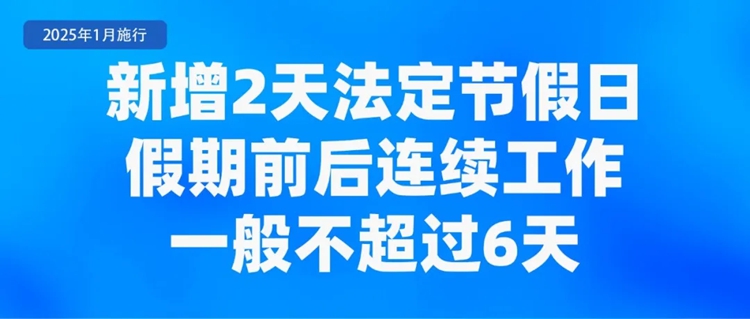
The Decision of the State Council on Amending the Measures for Holidays of National Festival and Memorial Day shall come into force on January 1, 2025. There are two articles in the Decision, which mainly stipulate the following contents. First, the holidays for all citizens will be increased by 2 days, that is, Lunar New Year’s Eve and May 2. After the increase, there will be 4 days for the Spring Festival (Lunar New Year’s Eve, the first day to the third day of the first month) and 2 days for Labor Day (May 1 and 2). Second, on holidays for all citizens, unified holidays can be arranged reasonably, and combined with the implementation of paid annual leave and other systems, a longer holiday can actually be formed. Except for a few special circumstances, the continuous work before and after the statutory holidays generally does not exceed 6 days.
Read in detail > >
Decision of the State Council on Amending the Measures for Holidays of National Festival and Memorial Day
Notice of the General Office of the State Council on the arrangement of some holidays in 2025
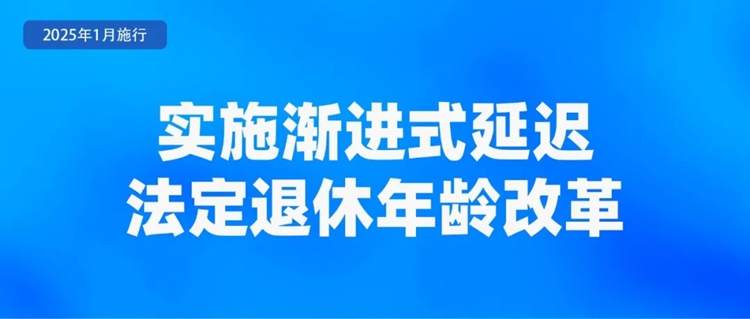
According to the "Decision on Implementing the Gradual Delay of the Statutory Retirement Age", from January 1, 2025, the statutory retirement age of male employees who were 60 years old will be delayed by one month every four months and gradually delayed to 63 years old; For female employees whose original legal retirement age is 55 years old, the legal retirement age is delayed by one month every four months and gradually delayed to 58 years old; The original statutory retirement age of female employees is 50 years old, and the statutory retirement age is delayed by one month every two months, and gradually delayed to 55 years old.
Read in detail > >
The National People’s Congress Standing Committee (NPCSC)’s decision on gradually delaying the statutory retirement age.
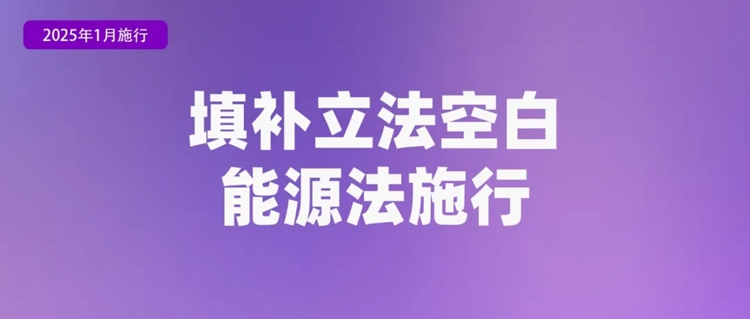
The Energy Law of People’s Republic of China (PRC) shall come into force on January 1, 2025. This law consists of nine chapters, including general principles, energy planning, energy development and utilization, energy market system, energy reserve and emergency, energy science and technology innovation, supervision and management, legal responsibilities, supplementary provisions, etc. Based on the reality of China’s energy resources endowment, energy law adapts to the new situation of energy development, and makes provisions on major basic issues in the energy field at the legal level. It is a basic and guiding law in the energy field.
Read in detail > >
Full-text Release: People’s Republic of China (PRC) Energy Law
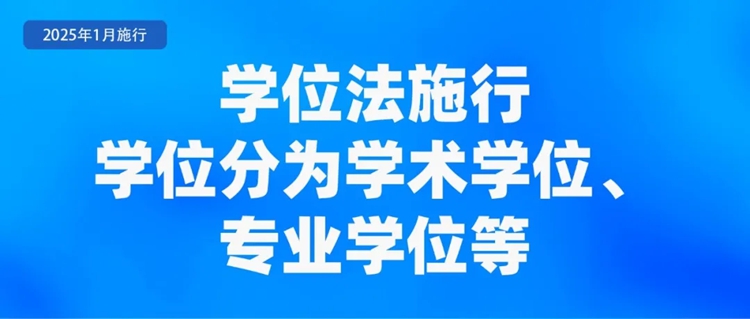
The Academic Degrees Law of People’s Republic of China (PRC) shall come into force on January 1, 2025. The degree law clarifies that degrees are divided into academic degrees and professional degrees, which is a major breakthrough in this legislation. The Academic Degrees Law clearly stipulates that the conditions for awarding are clearly defined according to the three levels of bachelor, master and doctor. According to the two types of academic degrees and professional degrees, the conditions for awarding degrees are stipulated respectively, which further reflects the differences and characteristics of the two types of degrees, in which academic degrees highlight academic research ability and professional degrees highlight professional practice ability.
Read in detail > >
People’s Republic of China (PRC) degree law
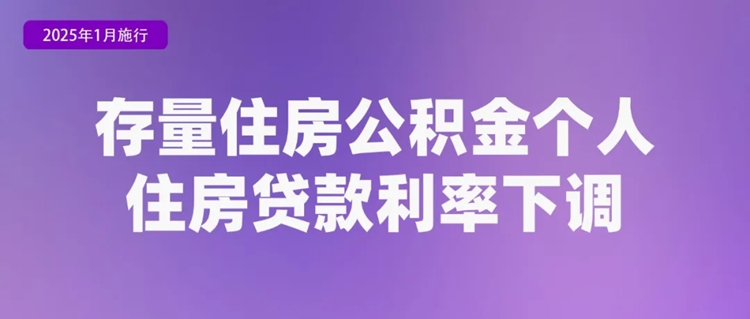
The Ministry of Housing and Urban-Rural Development issued a notice, demanding that the interest rate adjustment policy of individual housing loans for stock housing provident fund should be well connected. For loans with a term of one year or less, the contract interest rate should be implemented, and interest should not be calculated in sections; If the loan term is more than one year, the new interest rate regulations shall be implemented on January 1, 2025 according to the corresponding interest rate grades, unless otherwise stipulated by the state. Previously, the Notice of the People’s Bank of China on Lowering the Interest Rate of Personal Housing Provident Fund Loans required that the interest rate of personal housing provident fund loans should be lowered by 0.25 percentage point from May 18, 2024, and the interest rates of the first set of personal housing provident fund loans for less than five years (including five years) and more than five years should be adjusted to 2.35% and 2.85% respectively, and the interest rates of the second set of personal housing provident fund loans for less than five years (including five years) and more than five years should be adjusted to not less than. For individual housing provident fund loans issued before May 18, 2024, the adjusted interest rate will be implemented from January 1, 2025.
Read in detail > >
It is related to the convergence of the stock mortgage policy! The Ministry of Housing and Urban-Rural Development arranges the adjustment of personal mortgage interest rate of provident fund.
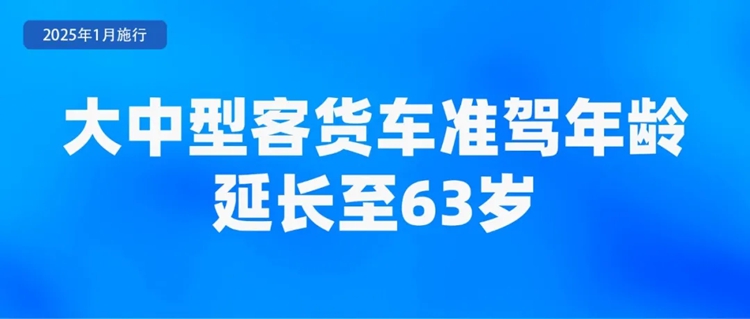
The revised Regulations on the Application and Use of Motor Vehicle Driving License will be implemented on January 1, 2025. This revision mainly includes two aspects: First, adjust the application age and the upper limit of the driving age for large and medium-sized vans. Extend the application age limit for driving licenses of large and medium-sized vans from 60 to 63, and extend the age limit for quasi-driving models of large and medium-sized vans from 60 to 63. The second is to clarify the requirements for drivers of large and medium-sized vans to apply for extension of driving time. It is clear that drivers over the age of 63 who need to continue driving large and medium-sized vans can apply to dmv for an extension of the driving qualification period of the original quasi-driving type after passing the physical examination and passing the tests of memory, judgment and responsiveness, and the extension period shall not exceed 3 years.
Read in detail > >
The Ministry of Public Security revised the Regulations on the Application and Use of Motor Vehicle Driver’s License to adjust the regulations on the application and age of driving license for large and medium-sized vans.

The National Medical Insurance Bureau and the Ministry of Human Resources and Social Security issued the National Drug List of Basic Medical Insurance, Work Injury Insurance and Maternity Insurance (2024). 91 kinds of drugs have been added to the national medical insurance drug list, and the total number of drugs has increased to 3159. The list will be implemented on January 1, 2025. Among 91 kinds of drugs, 89 kinds were included by negotiation/bidding, 2 kinds of drugs selected from national centralized procurement were directly included, and 43 kinds of drugs that have been replaced clinically or have not been produced and supplied for a long time were transferred out. In this catalogue adjustment, some negotiated drugs have been transferred out. In order to ensure the continuity of drug use, the notice proposes to give them a six-month transition period. Before the end of June 2025, the medical insurance fund can continue to pay according to the original payment standard. During the transition period, all co-ordination areas should take effective measures to make a good connection and guide designated medical institutions to replace them in time.
Read in detail > >
Add 91 kinds of drugs! The new national medical insurance drug list was announced.
The new version of the medical insurance drug list adds 91 drugs, detailed list!
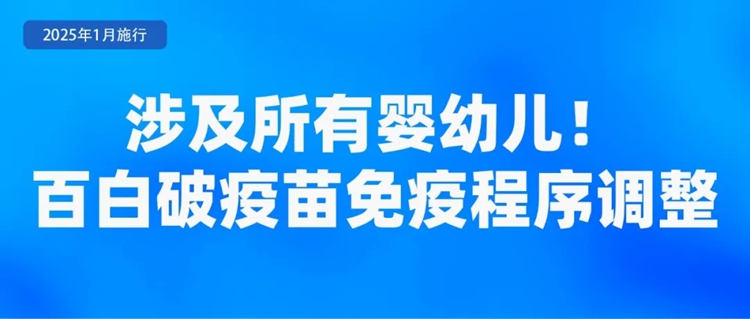
According to the requirements of the Notice on Relevant Work of the National Immunization Plan on the Adjustment of DTP Vaccine and DTP Vaccine Immunization Program, it will be implemented nationwide from January 1, 2025, and the current immunization program of 3-month-old, 4-month-old, 5-month-old and 18-month-old with one dose of acellular pertussis-diphtheria-tetanus combined vaccine and 6-year-old with one dose of diphtheria-tetanus combined vaccine will be adjusted to 2-month-old and April-old.
Read in detail > >
Notice on the work related to the adjustment of DTP vaccine and DTP vaccine immunization program in the national immunization plan
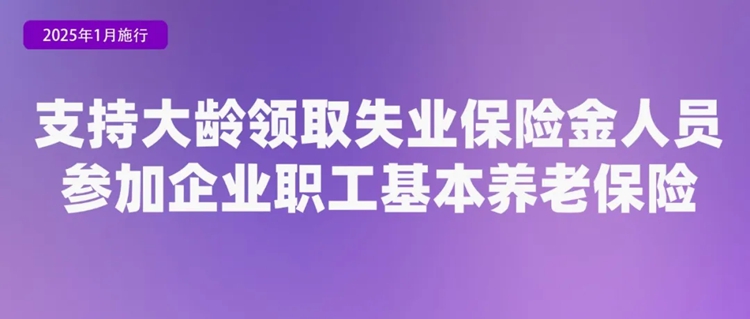
The Ministry of Human Resources and Social Security, the Ministry of Finance and the State Taxation Administration of The People’s Republic of China jointly issued the Notice on Issues Concerning the Participation of Older Persons Receiving Unemployment Insurance in the Basic Old-age Insurance for Enterprise Employees. It will come into force on January 1, 2025 and will be implemented until December 31, 2039. The "Notice" further refines the policy of the unemployment insurance fund to pay old-age insurance premiums for older people who receive unemployment insurance benefits, and makes specific provisions on policy targets, payment standards, and handling modes. The first is to clarify the scope of personnel. All unemployed people who receive unemployment insurance benefits and are less than one year away from the statutory retirement age, including those who continue to pay unemployment insurance benefits, are included in the scope of protection. The second is to clarify the payment standard. Older pensioners participate in the basic old-age insurance for enterprise employees in their personal capacity at the place where unemployment insurance benefits are paid, and part of the minimum payment standard for local flexible employees is paid by the unemployment insurance fund. The third is to clarify the handling mode. According to the policy of "pay first and then make up", older pensioners can apply to the agency for the expenses borne by the unemployment insurance fund after they have participated in the basic old-age insurance for enterprise employees and paid the fees themselves. At the same time, the agency is required to actively inform the eligible older pensioners of relevant policies.
Read in detail > >
It is related to the basic old-age insurance for enterprise employees! It will be implemented on January 1 next year.
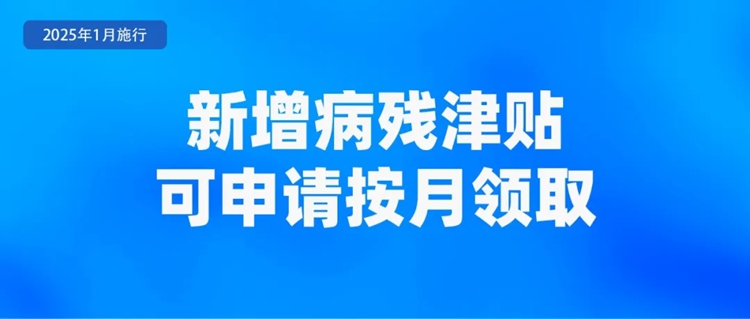
The Ministry of Human Resources and Social Security and the Ministry of Finance recently jointly issued the Interim Measures for the Disability Allowance of the Basic Old-age Insurance for Enterprise Employees, clarifying that from January 1, 2025, if the insured persons of the basic old-age insurance for enterprise employees are completely incapacitated due to illness or non-work-related disability, they can apply for receiving the disability allowance on a monthly basis, and the required funds will be paid by the basic old-age insurance fund.
Read in detail > >
The Ministry of Human Resources and Social Security and the Ministry of Finance jointly issued the Interim Measures for the Disability Allowance of Basic Old-age Insurance for Enterprise Employees.

The Ministry of Finance promulgated the Measures for the Administration of the List of Serious Untrustworthy Subjects in the CPA Industry, which will take effect on January 1, 2025. The Measures list the illegal acts with bad nature, serious circumstances, great social harm and serious disruption to the professional order of certified public accountants, including: certified public accountants are punished by suspending their business for 12 months, revoking their certificates, accounting firms are punished by suspending their business for 12 months and revoking their practice licenses, certified public accountants and accounting firms are investigated for criminal responsibility according to law for illegal practice, refusing to perform the punishment within the time limit and engaging in business without approval. The Measures established a credit repair mechanism in accordance with the law, stipulating that eligible parties who have been listed in the list of serious untrustworthy subjects for one year can apply for moving out in advance, except in cases that cannot be repaired by laws, administrative regulations and policy documents of the CPC Central Committee and the State Council, and detailed the procedures for moving out.
Read in detail > >
Measures for the administration of the list of serious untrustworthy subjects in the CPA industry
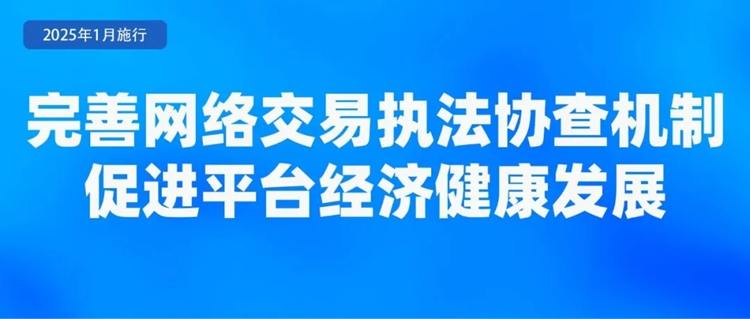
The General Administration of Market Supervision issued the Interim Measures for Law Enforcement Investigation of Online Transactions, which will take effect on January 20, 2025. The "Measures" clarify that the market supervision department may, according to laws and regulations, require the platform operators to provide information on the identity of the operators in the platform, goods or services, payment records, logistics express delivery, return and exchange, after-sales and other transaction information.
Read in detail > >
The General Administration of Market Supervision issued the Interim Measures for Law Enforcement Investigation of Online Transactions.
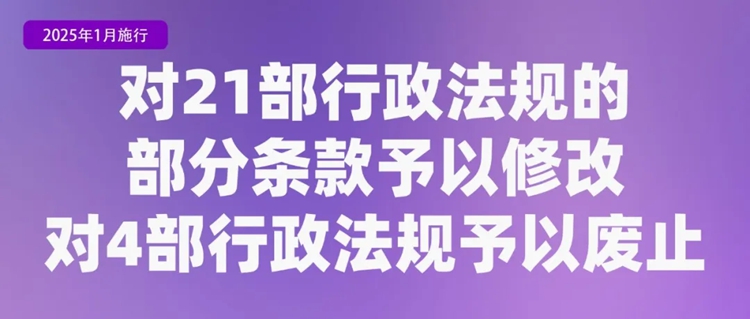
The Decision of the State Council Municipality on Amending and Abolishing Some Administrative Regulations shall come into force on January 20, 2025. The State Council cleaned up the administrative regulations involved, and decided to amend some provisions of 21 administrative regulations and abolish 4 administrative regulations. Five administrative regulations, such as the Regulations on the Supervision and Administration of Medical Devices, were revised, and the names of institutions that have not been used, changed institutions and institutions involved in the transfer of responsibilities were adjusted. Six administrative regulations, such as the Regulations on the Administration of Publishing, were revised. According to the Decision of the State Council on Cancelling and Adjusting a Batch of Fines (Guo Fa [2023] No.20), the types and ranges of relevant penalties were revised accordingly, and the amount and calculation method of relevant fines were adjusted. Seven administrative regulations, such as the Regulations on the Administration of Internet Service Sites, were revised, and the successful experience of temporarily adjusting and applying the relevant administrative regulations in the Pilot Free Trade Zone was promoted nationwide, some examination and approval items were cancelled, and some examination and approval items were changed to filing management. In addition, three administrative regulations have been revised, simplifying the certification of relevant official documents. At the same time, four administrative regulations, including the Provisions on Several Issues concerning patriotic health campaign committee and its Offices, were abolished.
Read in detail > >
Li Qiang signed the the State Council Order to promulgate the Decision of the State Council on Amending and Abolishing Some Administrative Regulations.

The Regulations on Network Data Security Management shall come into force on January 1, 2025. The Regulations explicitly encourage the innovative application of network data in various industries and fields, protect network data by classification, actively participate in the formulation of international rules and standards related to network data security, strengthen industry self-discipline, and prohibit illegal network data processing activities. The "Regulations" refine the provisions on the protection of personal information. Clarify the rules for handling personal information and the specific provisions that should be observed. Network data processors are required to provide convenient ways and means to support individuals to exercise their rights, and unreasonable conditions are not allowed to restrict individuals’ reasonable requests. Clarify the protection obligation of collecting personal information by using automatic collection technology, and refine the realization way of personal information transfer request.
Read in detail > >
Li Qiang signed the the State Council Order to promulgate the Regulations on the Security Management of Network Data.
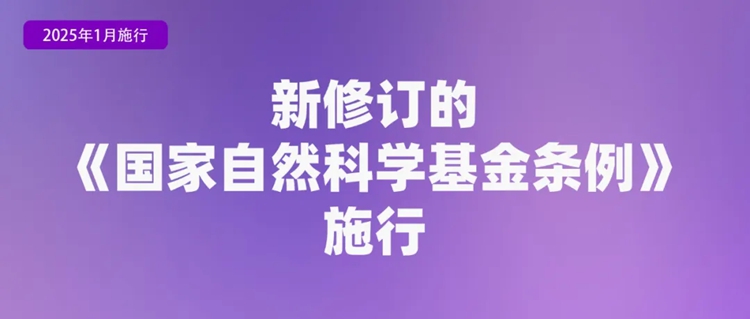
The revised Regulations of the National Natural Science Foundation shall come into force on January 1, 2025. The Regulations consist of 7 chapters and 45 articles. The "Regulations" make it clear that the natural science fund mainly comes from the central budget, and local governments, enterprises and other organizations are encouraged to invest in the form of joint funding, and social forces are encouraged to donate. The revised "Regulations" expand the scope of supporting units. Except for institutions of higher learning, scientific research institutions and relevant public welfare institutions, other units that meet the requirements of the state can be registered as supporting units. The "Regulations" clearly set up special funds to train young scientific and technical talents and support young talents who have made outstanding achievements in the field of science and technology and have obvious innovation potential.
Read in detail > >
Li Qiang signed the the State Council Order to promulgate the revised Regulations of the National Natural Science Foundation.

The revised Martyrs’ Commendation Regulations shall come into force on January 1, 2025. There are 8 chapters and 70 articles in the Regulations, and the main contents of the revision are as follows. The first is to further clarify the working principles. It is stipulated that the martyrs praise the work and adhere to the leadership of the Communist Party of China (CPC); The state praises, commemorates and protects martyrs, safeguards the dignity and honor of martyrs, protects the legitimate rights and interests of martyrs’ survivors, publicizes the deeds and spirit of martyrs, and promotes socialist core values. The second is to improve the conditions and procedures for evaluating martyrs. Supplement the evaluation of martyrs, improve the review procedures after evaluation, and strengthen information reporting. The third is to improve pension benefits and service guarantees. Clarify the channels for granting one-time pensions, and grant regular living allowances to the elderly children of martyrs. Implement dynamic and accurate management, and confirm the recipients of regular pensions and subsidies every year. Strengthen honor incentives and preferential treatment. The fourth is to strengthen the protection and management of martyrs memorial facilities. Increase the responsibilities of the government and relevant departments. Refine the requirements for defining the scope of protection, and define the scope of protection according to the category, scale, protection level and surrounding environment. It is emphasized that land and facilities within the scope of protection should not be encroached upon, and restrictions on engineering construction in the surrounding areas should be increased. The fifth is to increase publicity and promotion. Strengthen the publicity and education of martyrs’ deeds and spirit, and establish and improve the system of martyrs’ sacrifice and sweeping and etiquette norms.
Read in detail > >
Li Qiang signed the the State Council Order to promulgate the revised Martyrs’ Commendation Regulations.
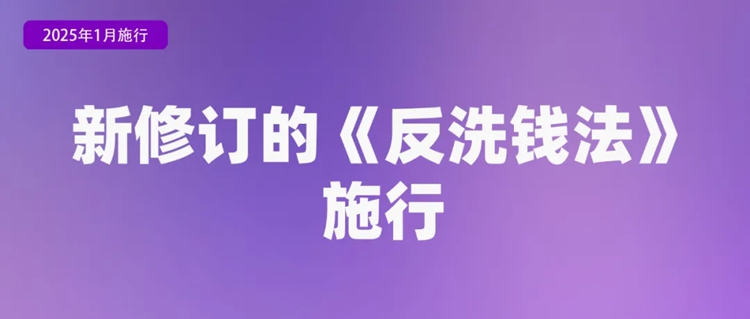
The revised Anti-Money Laundering Law of People’s Republic of China (PRC) shall come into force on January 1, 2025. The Anti-Money Laundering Law further improves the definition of anti-money laundering. On the basis of retaining seven types of key crimes in the upstream crime of money laundering, it is stipulated that concealing and concealing the criminal proceeds of "other crimes" and the source and nature of their proceeds also belong to money laundering activities. In view of some illegal money laundering behaviors such as "underground money houses", the Anti-Money Laundering Law further clarifies the connection with the criminal law, and clearly stipulates that those who use financial institutions or specific non-financial institutions to commit money laundering crimes or commit money laundering crimes through illegal channels shall be investigated for criminal responsibility according to law. The conditions for financial institutions to take money laundering risk management measures shall not take measures that obviously do not match the risk situation of money laundering, and guarantee the basic and necessary financial services related to medical care, social security and public utility services enjoyed by customers according to law.
Read in detail > >
People’s Republic of China (PRC) anti-money laundering law


